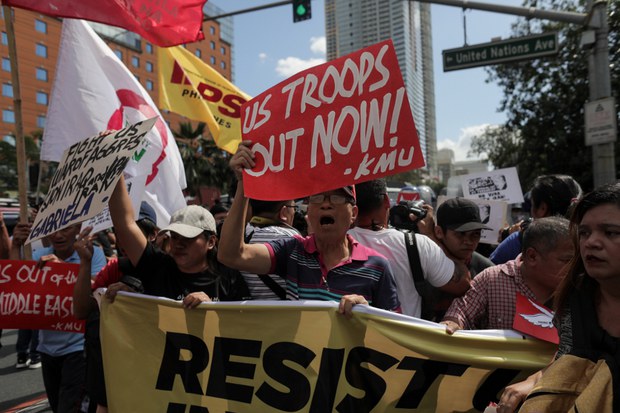Philippines: President Duterte Bars Cabinet from US Travel
2020.01.30
Davao and Cotabato, Philippines
 Filipino demonstrators protest near the American embassy in Manila against a U.S. drone strike that killed a top Iranian general in Baghdad, Jan. 6, 2020.
Filipino demonstrators protest near the American embassy in Manila against a U.S. drone strike that killed a top Iranian general in Baghdad, Jan. 6, 2020.
President Rodrigo Duterte ordered his entire cabinet to avoid travel to the United States, an official confirmed Thursday, after the leader voiced anger over Washington’s reported cancellation of a U.S. visa for the ex-top enforcer of the Philippines’ drug war.
The president also renewed a threat he made last week, saying he was considering pulling out of a decades-old military pact with the U.S. because of his displeasure with the move to cancel the visa for Ronald dela Rosa, his ex-national police chief.
“Last night the president issued a directive for cabinet members not to travel to the U.S.,” Interior Secretary Eduardo Año told reporters on the sidelines of a breakfast forum at the Foreign Correspondents Association of the Philippines (FOCAP) in Manila.
While the order likely would exempt cabinet members travelling stateside for medical reasons, Año said members would “abide by the instruction of the president.”
The cabinet was expected to discuss the president’s directive for a U.S. travel ban when its members reconvene next week, he added.
In an impromptu interview with reporters on Wednesday evening, Duterte said he would not allow members of his cabinet to go to the United States.
“I will leave it siguro sa (perhaps to) foreign affairs, but I will not allow any Cabinet member to go there at this time. No Cabinet member should be allowed to go to the United States ... indefinitely,” the president said, according to Rappler, a Philippine news site.
The decision was meant to “limit our contact in whatever aspect of international relations,” Duterte said, while reiterating his threat to terminate the bilateral Visiting Forces Agreement (VFA), a pact allowing American troops on Philippine soil.
The president first made the threat after dela Rosa, now a Philippine senator, alleged that the United States had cancelled his visa for entry on U.S. territory. The former police general surmised that the cancellation had to do with his having been chief enforcer of the Duterte administration’s bloody crackdown on narcotics.
According to official figures, the campaign has left nearly 6,000 suspected drug dealers and users dead since the president took power in mid-2016, but human rights groups estimate the death toll could be twice as high.
Duterte also noted that the U.S. Senate had passed a budget resolution containing a provision that Philippine officials who were linked to the jailing of Philippine Sen. Leila de Lima be barred from entering the United States.
In Washington, U.S. State Department officials did not immediately respond Thursday to a BenarNews request seeking confirmation on the cancellation of dela Rosa’s visa.
De Lima, a former rights commissioner, is among the leading critics of Duterte’s drug war. The government has jailed her on charges that she received payoffs from drug dealers when she served as justice secretary. She has denied the allegations, saying these were intended to silence her for criticizing Duterte,
Potential implications
The 1999 Visiting Forces Agreement allows the two allies to carry out large-scale joint exercises.
The pact has been used to boost military cooperation at a time when the Philippines faces territorial challenges from China, which is competing with Southeast Asian and other countries in the disputed South China Sea.
Last week, Duterte said that he was giving the U.S. government a chance to “correct” the cancellation of dela Rosa’s visa, or the military pact would be scrapped.
Barry Gutierrez, a spokesman for Duterte’s rival, Vice President Leni Robredo, said that if the government cancelled the pact, this could also jeopardize the country’s military modernization program.
“This has an implication in the security of our country. Dependent on that, for instance, is the huge part of the armed forces’ modernization, those joint exercises with the U.S., those ongoing training of officials in America — all of that has implications,” Gutierrez said on Thursday.
“There are some criticisms that the VFA has unequal provisions. For me, if that’s the perspective, then it should be studied and reviewed on that angle - but not on a personal angle. Just because a senator’s visa had been canceled, we will end an agreement like this, which has a huge implication in our country,” he added.
However, according to another observer, Duterte’s China-centric foreign policy may have spurred his recent actions rather than his anger over a cancelled visa.
Since taking office, Duterte has consistently looked towards Beijing as a military and economic partner and away from the United States, his country’s long-time ally.
“Duterte’s action is calculated … to weaken the alliance in the long run,” Jose Antonio Custodio, a defense analyst at the Institute of Policy, Strategy and Development Studies, told BenarNews.
“He had already expected the U.S. to impose sanctions to his abysmal human rights record, and hence he has aligned himself to China.”
For Duterte to do away with the military alliance with the United States would ultimately weaken the Philippines militarily, not just against internal threats but also against “external threats like China,” Custodio said.
BenarNews staff contributed to this report from Manila.







